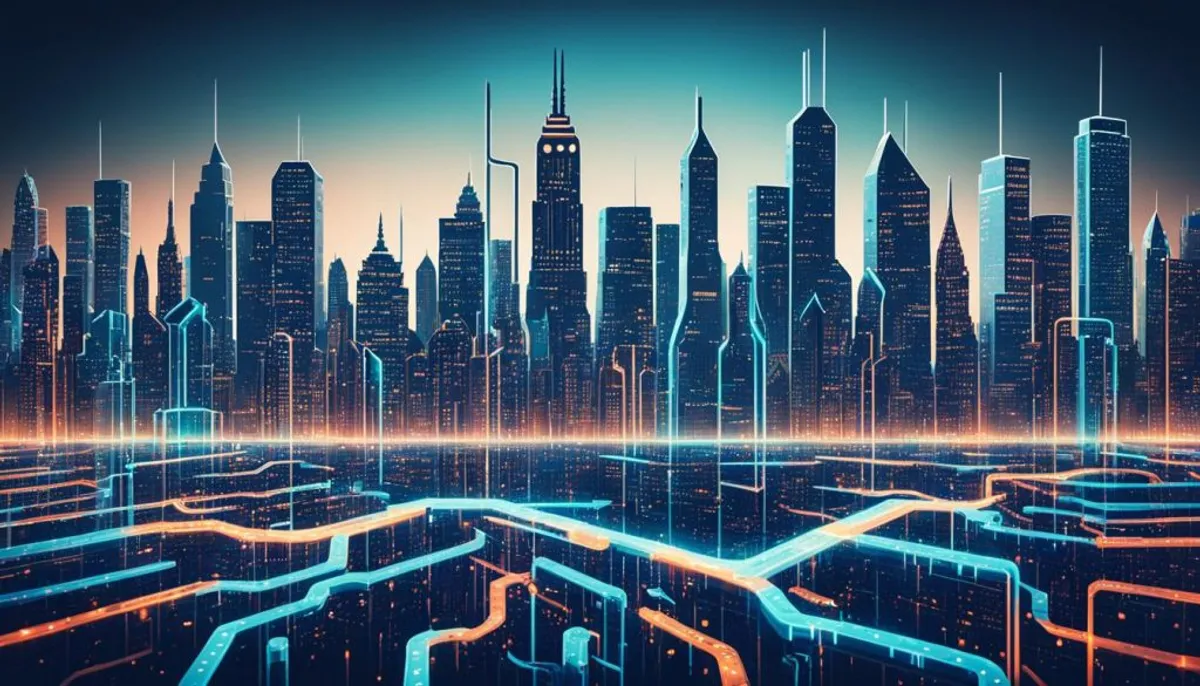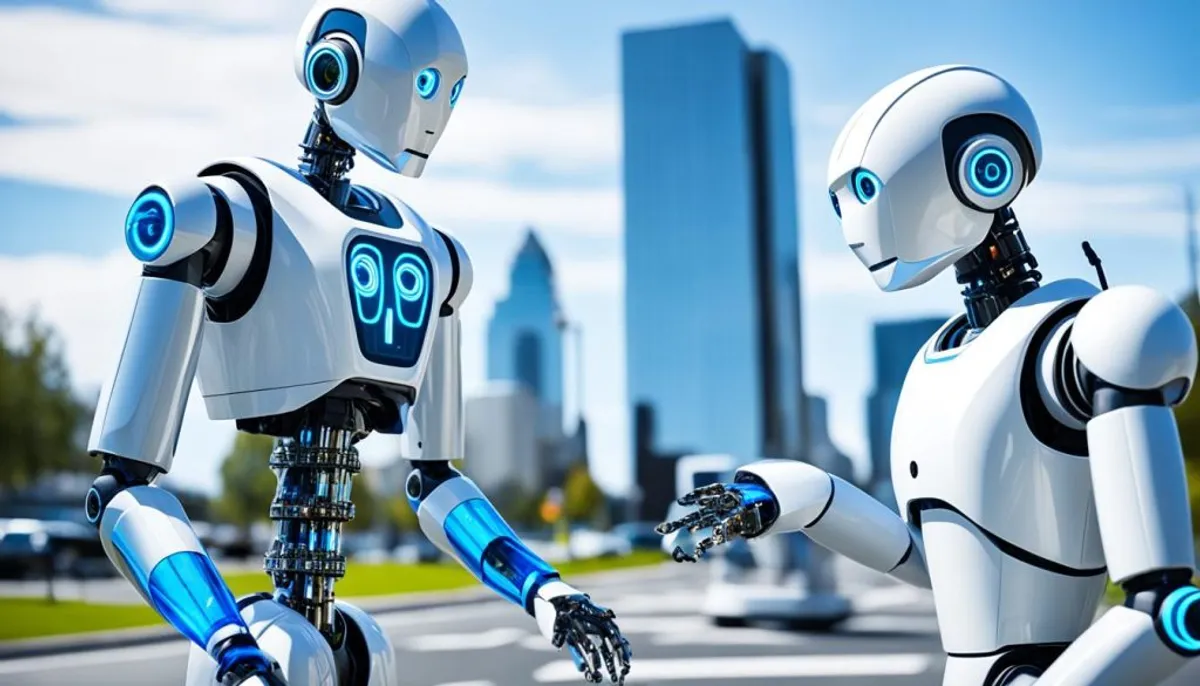AI has moved from sci-fi dreams to our everyday lives. It helps us pick movies and drive safer. ChatGPT has shown us AI’s true power and what it could mean for us.

At its core, AI is smart software that acts like a human brain. It uses complex math to see, think, learn, and make choices. AI comes in many forms, from simple rules to complex learning. As it grows, it’s changing how we work, play, and live.
Key Takeaways
- AI has evolved from fiction to practical applications in daily life
- ChatGPT showcases the potential of generative AI
- AI simulates human intelligence through various algorithms
- Machine learning is a key component of modern AI systems
- AI is reshaping industries and personal experiences
The Evolution of Artificial Intelligence
The history of AI has been long and exciting, filled with big steps forward. It started with early chess computers and has grown to today’s advanced generative AI. This journey is truly amazing.
From Chess Computers to Generative AI
In 1997, IBM’s Deep Blue beat world chess champion Garry Kasparov. This was a big moment for AI, showing how smart machines could be. Then, in 2018, OpenAI’s GPT models came out, changing how we use language.
Milestones in AI Development
IBM Watson won at Jeopardy! in 2011, showing how AI could understand human language. Deep learning has led to big advances in things like image recognition and self-driving cars.
Current State of AI Adoption
AI is now widely used in many areas. A recent survey found 42% of big companies use AI. Generative AI is especially popular, with 38% of businesses using it.
| AI Category | Adoption Rate | Primary Use Cases |
|---|---|---|
| General AI | 42% | Data analysis, process automation |
| Generative AI | 38% | Content creation, product design |
| Machine Learning | 56% | Predictive analytics, personalization |
As AI keeps getting better, we’ll see even more new uses in different areas. It will change our future in ways we’re just starting to see.
Understanding Artificial Intelligence
Artificial Intelligence (AI) is a field that makes machines think like humans. It includes systems that can see, think, learn, and decide on their own. This has changed many areas, like healthcare and finance.
There are many types of AI, each with its own strengths and uses. Rule-based systems use set rules to solve problems. Machine learning gets better over time without needing to be told how. Neural networks work like the human brain to spot patterns and make choices.
Deep learning is a part of machine learning that uses complex neural networks. It helps with things like recognizing images, understanding language, and making self-driving cars.
“AI is the new electricity. Just as electricity changed everything 100 years ago, today I actually have a hard time thinking of an industry that I don’t think AI will transform in the next several years.”
AI has many uses and is getting more important. In healthcare, it helps find diseases and find new medicines. Banks use it to spot fraud and assess risks. Factories use it to make things better and predict when machines will break.
| AI Type | Key Feature | Example Application |
|---|---|---|
| Machine Learning | Learns from data | Spam email detection |
| Deep Learning | Uses neural networks | Facial recognition |
| Rule-based AI | Follows predefined rules | Chess computers |
As AI grows, it will change our world in big ways. Knowing about AI is key for anyone wanting to understand our tech-filled future.
AI’s Impact on Business and Industry
AI is changing how businesses work across many industries. Companies use it to make things run smoother and work better. This technology is changing how businesses compete worldwide.
Automation and Efficiency
AI is making workflows faster. Now, tasks that used to take humans time are done by smart systems. This lets workers focus on more important tasks, making things more efficient.
Decision-Making and Data Analysis
Data analysis is key in today’s business world. AI can quickly go through huge amounts of data. It finds patterns and insights that people might not see, leading to better decisions.
Customer Service and Engagement
AI is changing how companies talk to customers. Chatbots and virtual assistants answer simple questions all the time. This makes customers happier and helps human agents deal with harder issues.
| AI Application | Business Impact |
|---|---|
| Automation | Increased productivity, reduced errors |
| Data Analysis | Improved decision-making, strategic insights |
| Customer Service | Enhanced customer satisfaction, 24/7 support |
As AI gets better, its effect on business will grow. Companies that use this tech will get ahead in their fields.
The Future of Work in an AI-Driven World

The job market is changing fast as AI becomes more common. Now, many employees think AI could take over almost a third of their work. This change is making people both excited and worried about their jobs.
Some jobs might get automated, but new ones are popping up. Jobs like machine learning specialists and AI trainers are wanted. The effect is different for each industry, with manual jobs at a higher risk of being replaced.
“AI is not just changing how we work, but what work we do. It’s creating new career paths while altering existing ones.”
Jobs that need skills and creativity are more likely to work with AI, not be replaced by it. This means people need to learn new skills and get retrained in many areas. The future workers will need to learn how to work with AI systems and develop new skills to keep up in the changing job market.
- AI is reshaping employment landscape
- New roles emerging in AI and machine learning
- Upskilling and retraining becoming crucial
- Collaboration between humans and AI systems increasing
As we deal with these changes, it’s clear that accepting AI and focusing on skills only humans have will help us succeed in the AI-driven work world.
Artificial Intelligence in Healthcare
AI is changing healthcare by offering new ways to find diseases, discover drugs, and care for patients. It’s changing how doctors and other healthcare workers diagnose and treat patients.
Disease Detection and Diagnosis
AI is making doctors more accurate in spotting diseases. It looks at huge amounts of data, like medical images and genes, to find patterns humans might miss. This means doctors can diagnose diseases earlier and more accurately, which could save lives.
Drug Discovery and Development
AI is speeding up how we find new drugs. It can look at millions of compounds to find ones that could be new medicines. This could mean getting new medicines to people faster.
Virtual Nursing Assistants
AI is making virtual healthcare a reality with nursing assistants. These digital helpers can check on patients from afar, answer health questions, and remind patients to take their medicine. This helps patients get better care and lets human nurses focus on harder tasks.
| AI Application | Benefits | Challenges |
|---|---|---|
| Medical Diagnosis | Increased accuracy, Early detection | Data privacy concerns |
| Drug Discovery | Faster development, Cost reduction | Regulatory hurdles |
| Virtual Nursing | 24/7 patient support, Reduced workload for staff | Limited human interaction |
As AI gets better, it will have a bigger impact on healthcare. It promises a future where healthcare is more efficient, accurate, and tailored to each patient.
AI in Education: Transforming Learning Experiences
AI is changing how students learn and teachers teach. It brings personalized learning to the forefront. This technology adapts to each student’s unique needs and pace.
AI can analyze student performance and find areas for improvement. It can also tailor lessons to fit each student better.
One big plus of AI in education is its instant feedback. Students don’t have to wait days or weeks for their grades. AI systems give feedback right away, helping students stay on track and motivated.
Personalized learning is key to AI’s effect on education. AI looks at lots of data to make learning paths for each student. This way, fast learners get more challenges, and those who need help get the support they need.
“AI is not replacing teachers; it’s empowering them to be more effective and focus on what matters most – inspiring and guiding students.”
AI helps beyond the classroom too. Virtual tutors and chatbots offer help anytime, answering questions and explaining things on demand. This means students can learn without getting stuck or frustrated.
- AI detects plagiarism with higher accuracy
- Automated grading saves teachers time
- Adaptive learning systems personalize content delivery
- Emotion recognition helps identify struggling students
As AI keeps getting better, its role in education will expand. From preschool to college, AI will change learning experiences. It will make education more accessible, engaging, and effective for everyone.
Ethical Considerations and AI Development
AI technology is getting more advanced, and with it, ethical challenges arise. Issues like AI ethics, data privacy, AI bias, and AI transparency are crucial. They will shape the future of artificial intelligence.
Data Privacy Concerns
AI systems gather a lot of personal data. This brings up questions about keeping this data private and safe. The Federal Trade Commission is looking into how AI companies handle this data. We need stronger rules to protect user info.
Bias and Fairness in AI Systems
AI bias is a big problem, especially with facial recognition tech. Biased training data or wrong algorithms can lead to unfair results. Developers must find and fix bias to make sure AI treats everyone fairly.
Transparency and Accountability
AI needs to be transparent to build trust. Users should know how AI affects them. Companies must take responsibility for their AI’s actions. Clear rules and oversight can help make AI development responsible.
| Ethical Consideration | Challenge | Potential Solution |
|---|---|---|
| Data Privacy | Unauthorized data collection | Stricter regulations and user consent |
| AI Bias | Unfair treatment of certain groups | Diverse training data and algorithmic audits |
| AI Transparency | Lack of understanding in decision-making | Explainable AI and clear documentation |
It’s crucial to tackle these ethical issues for responsible AI development and its use. As AI changes our world, making sure it’s used ethically is key.
The Role of AI in Addressing Global Challenges
AI is changing how we deal with global problems. It’s using sustainable AI and AI climate solutions to help us. This technology is making a better future possible.

Sustainable AI is big in making supply chains better and predicting when things need fixing. These changes help cut down on carbon emissions and make industries more eco-friendly.
AI is leading the way in fighting climate change. Scientists are working on algorithms to forecast weather, manage resources, and lessen climate change’s effects.
“AI has the potential to be a game-changer in our fight against global warming, offering unprecedented insights and solutions.”
But, AI has its own environmental impact. The energy needed for AI can increase emissions a lot. Finding a balance between AI’s benefits and its environmental costs is a big challenge.
| AI Application | Benefit | Challenge |
|---|---|---|
| Supply Chain Optimization | Reduced carbon emissions | High energy consumption |
| Predictive Maintenance | Improved efficiency | Initial implementation costs |
| Climate Modeling | Better disaster preparedness | Data accuracy concerns |
AI is also helping in education and healthcare, especially in places that need it most. AI tools are making quality education and healthcare more accessible. This is helping bridge gaps and open new opportunities for millions.
Potential Risks and Challenges of AI
AI technology is moving fast, bringing both good and bad sides. It introduces new risks that we must face.
Job Displacement
AI risks include big job losses. Many workers might lose their jobs as machines do routine tasks. This change hits many fields, like making things and helping customers.
A study found 44% of workers could see their skills change because of AI from 2023 to 2028. Women are more likely to lose their jobs because of AI in their current roles.
Security and Misuse
AI security worries are growing. Bad people can use AI for bad things, like making fake videos or launching big cyberattacks. As AI gets stronger, the chance of misuse goes up.
Socioeconomic Disparities
AI inequality is a big problem. Using AI might make the gap between those with good education and resources and those without bigger. This could make social and economic divisions worse.
| AI Challenge | Potential Impact | Mitigation Strategy |
|---|---|---|
| Job Displacement | Widespread unemployment | Reskilling programs |
| Security Risks | Increased cyber threats | Enhanced AI security measures |
| Socioeconomic Gap | Widening wealth inequality | Inclusive AI policies |
We need to act fast in education, making policies, and making AI ethical. By facing these challenges, we can make sure AI helps everyone in society.
Conclusion
Artificial Intelligence is changing our world fast. It’s making a big difference in healthcare and education. The future looks bright as AI helps solve tough problems and makes things more efficient.
As we move forward, we see both good and bad sides of AI. It’s changing jobs and how we work and learn. But, it also offers hope for fighting big issues like climate change and diseases.
We need to be careful as we use this new technology. We must think about privacy, fairness, and misuse of AI. Finding a balance is key. We need to use AI’s power for good and make sure it helps everyone.
As we enter this new era, talking, making smart rules, and ethical guidelines are vital. These will help us make a future where AI and humans work well together.
FAQ
What is Artificial Intelligence (AI)?
AI means software that acts like a human brain through algorithms. It does tasks like seeing, thinking, learning, and making choices. There are many types, like rule-based systems and machine learning.
How is AI transforming businesses?
AI is changing businesses by automating tasks and making better decisions. It’s making companies more efficient and productive. Now, 55% of companies use AI in some way.
What impact will AI have on the job market?
AI is changing the job market, with many jobs at risk of being automated. But, new jobs like machine learning specialists are coming up. People in creative jobs are more likely to work with AI, not be replaced by it.
How is AI being applied in healthcare?
AI is making healthcare better by finding diseases faster and helping with drug development. It uses big data to spot diseases and speed up drug creation. It also helps with virtual patient care.
What role does AI play in education?
AI is changing education by making learning more personal. It adjusts learning to what each student needs. It also helps teachers with their work, so they can teach more and interact with students better.
What are the ethical concerns surrounding AI development?
Ethical AI focuses on keeping data safe and making sure AI is fair. It’s important to make AI open and fair to build trust. This means dealing with how data is used and avoiding biased AI.
How can AI address global challenges?
AI can help with big issues like saving the planet by making supply chains better and predicting when things need fixing. But, making AI requires a lot of energy, which could increase carbon emissions. We need to find a way to balance this.
What are the potential risks and challenges of AI?
AI could lead to job losses, with 44% of jobs at risk by 2028. There are also security worries about AI being used for bad things. And, AI might make things worse for some people if they can’t get to the new tech and education.
RelatedRelated articles



